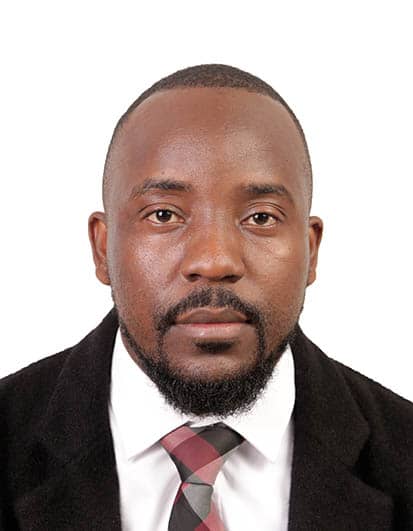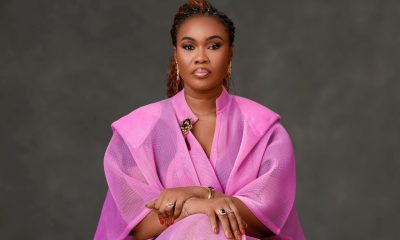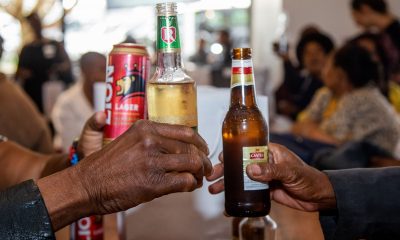Africa speaks
Exploring a new model for cooperation between business and society- Nonny Ugboma

Nonny Ugboma is the Executive Secretary of the MTN Foundation (Image source: Nonny Ugboma)
The hand-me-down capitalism models Africa inherited from her colonial masters have failed to yield a prosperous continent despite its vast resources. Therefore, Africa is in desperate need of something different that takes into consideration its unique history, qualities, and context.
Experts have mostly seen the interdependence of businesses and society as transactional, with the society needing business for products and services, for jobs, for government taxes revenues. In turn, business needs the society for the market, sales and profits and public infrastructure, security and the rule of law! According to Amaeshi (2019) businesses, though sympathetic to societal challenges, are reluctant to act positively through their companies as they sometimes see such requests as irrelevant to their objectives.
However, due to the interdependency and interconnectedness of business and society, companies must work collaboratively with the government for a common purpose. That purpose is to build local resources.
There have been calls for western economies to rethink their capitalism model (Jacobs & Mazzucato, 2016). There have also been calls for Africa to develop its model of capitalism, with theorists and entrepreneurs exploring ideas like Africapitalism (Amaeshi, 2015). Africapitalism, coined by Nigerian entrepreneur Tony Elumelu, focuses on the role of business leaders, investors, and entrepreneurs on the continent’s development to create economic prosperity and social wealth. It rests on the following four pillars: a sense of progress and prosperity; the sense of parity and inclusion; a sense of peace and harmony; and a sense of place and belongingness.
Africa does need its model. However, I would argue that this model should be spearheaded by the state in collaboration with willing stakeholders in the private sector and third sector, unlike Africapitalism. A government-led push is especially relevant now that a few 21st century economists are reassessing and rethinking capitalism in its present form. One of such critics is UCL’s Mazzucato (2018) The Entrepreneurial State: Debunking Public vs Private Sector Myths who debunks the mainstream neo-classical narrative that the private sector alone drives innovation but takes the position that the state is the driver of innovation.
Mission-Oriented Innovation Approach (MOIA) could help address some of the identified gaps to ensure state and business work jointly to solve grand challenges, to co-create public value and co-shape a robust and sustainable society that it can bequeath to future generations.
There is, therefore, a need for an alternative model of collaboration for business, society and government. A suggested way forward for Nigeria, and indeed Africa, is to embrace a mission-oriented innovation approach. The concept of the mission-oriented approach that involves government co-creating and co-shaping the market with the private and third sectors has enormous potential for Africa. The four pillars of ROAR, developed by Mariana Mazzucato (2016), is a useful tool-set to anchor MOIA in Africa:
1. Routes and directions– Government and Public institutions and agencies to set
missions. Also, private sector leaders can nudge government agencies to agree to
work collaboratively on national priority areas.
2. Organisational Capacity– Building of dynamic Capabilities within the Public sector through advocacy, capacity building, conferences and training.
3. Assessment and evaluation– Agencies, academia and organisations to determine new
dynamic tools to assess public policies to create new models and markets.
4. Risks and rewards– Government and private organisations need to engage on the
best risks and rewards sharing formats from initiatives to ensure smart, inclusive and
sustainable growth.
In conclusion, as Western Economies are reviewing and rethinking capitalism and their operating models, Africa must ensure she does the same. The reason is that the future of the development of the continent depends on the economic model that it chooses to adopt, in the future, especially with the growing youthful population.
Aurthor: Nonny Ugboma is the Executive Secretary of the MTN Foundation and has recently returned from one-year Sabbatical studying for a master’s degree in Public Administration from the University of London Institute for innovation and Public Purpose.
Africa speaks
Africa needs to leverage Fund for Responding to Loss and Damage to enhance resilience of its cities

By Dr Muhammad Gambo
The issue of climate change and its associated impacts, especially on African cities, is a critical topic that demands urgent attention.
Every day, Africa faces the consequences of something it did not cause. While 7 out of the 10 world most climate vulnerable countries are in the African region, Africa only emits about 4% of greenhouse gases, and in terms of historical contributions the content ranks even lower – according to World Meteorological Organization’s State of the Global Climate report 2022.
Heatwaves, heavy rains, floods, tropical cyclones, and prolonged droughts, which are some of the effects of climate change, are having devastating impacts on communities and economies, with increasing numbers of people at risk across the continent. Africa’s rapidly expanding cities are hotspots of this vulnerability and impact.
According to the OECD report, Africa is one of the world’s least urbanized continents, yet hosts the most rapidly urbanizing region – the Sub-Saharan Africa (SSA). The region has an urban population of 500 million people, accounting for approximately 40% of the continent’s population, and an urban growth rate double that of the global average at 4.1% per year, compared to the global average of 2.1%. By 2050, it is estimated that over 60% of Africans will be living in urban areas.
This accelerated urban growth puts further pressure on existing challenges such as inadequate infrastructure, insufficient access to basic services, unemployment, and housing shortages. About 56% of urban population in Africa reside in informal settlements, compounded by insecure land tenure and constrained access to essential infrastructural services such as sanitation, water and energy, according to the African Cities Research Consortium and Brookings – 2024 reports.
A Climate Crisis
It’s widely acknowledged that climate change will affect Africa’s socio-economic development trajectory, threatening the continent’s attainment of the 2030 Sustainable Development Goals and the objectives of the Africa Union’s Agenda 2063.
In UN Secretary-General António Guterres’ own words, “Africa is on the frontlines of the climate crisis. The time for action is now. We must invest in sustainable solutions to protect our people and planet.”
But all is not lost. One of the recent global developments in climate policy has been the establishment of the Fund for Responding to Loss and Damage (FRLD), which aims to provide financial support to vulnerable countries affected by climate disasters.
The Fund, established during the COP27 negotiations, holds significant potential for African nations, especially in the context of urban development and the challenges faced by rapidly growing cities across the continent. It has the potential to serve as a powerful tool to address both the immediate impacts of climate disasters and the longer-term need for sustainable urban development in Africa, through the principle of “building back better”.
Firstly, the Fund could be channeled into immediate relief and rebuilding efforts, such as reconstructing homes, improving drainage systems to mitigate flooding, and ensuring access to clean water and sanitation. For example, funding could support the delivery of infrastructure that can withstand natural disasters, such as resilient affordable housing and other related climate resilient infrastructure for cities. Ensuring climate resilience and addressing key infrastructural shortages that exacerbate vulnerability is crucial in all activities the Fund will support.
Such projects would create more sustainable cities that are better equipped to handle the intensifying impacts of climate change while simultaneously offering economic opportunities through job creation.
Secondly, the Fund could be used to empower local communities, particularly marginalized populations in urban slums and informal settlements, who are often the hardest hit by climate disasters. Supporting these actors to adapt and develop is crucial for sustained resilience. Also, the informal economy – which forms a significant part of Africa’s urban economy – should not be left behind.
Finally, the Fund could be used to support capacity building initiatives such as training local leaders, strengthening disaster management systems, and creating meaningful climate partnerships.
Reimagining African cities
That said, the Fund for Responding to Loss and Damage has the potential to play a transformative role in the urban development of African cities, particularly in mitigating and adapting to the impacts of climate change.
Whether this potential is reached depends on the setup of the Fund and the criteria used to assess projects – and whether those are in line with African realities in terms of data and capacity availability. It also depends on careful planning and effective collaboration to ensure that the Fund benefits those who need it most.
This is a unique opportunity to not only address the consequences of climate change, but also to reimagine African cities as models of sustainability and inclusivity for the future.
Dr Gambo is the Head of Policy, Research and Partnerships at Shelter Afrique Development Bank.
Africa speaks
Fighting Battles that Matter

By: Nchimunya Muvwende, an Economist
In the global arena, which is full of challenges, nations are duty-bound to choose the battles they will fight. Different factors influence the choices of fights to be involved in. For the wealthy and developed nations, it is mostly battles of expanding their territories, dominating trade routes, securing natural resources, and building the best armies to protect their nations. What of African nations? Have they identified the right fights, and are they engaged in the right battles, or is it a matter of imitating others – thinking that by walking their path and duplicating their efforts, they too will develop? This article focuses on identifying the fights that should matter for developing nations, especially in Africa.
Global Battles
Over the years, big nations have been engaged in fierce fights that leave the rest of the world wondering and adversely affected. Geopolitical wars have adversely affected global supply chains with nations upscaling their military expenditure. A Stockholm International Peace Research Institute report shows that, in 2024 alone, military spending hit a record US$2.7 trillion, with the USA, China, Russia, Germany and India accounting for 60% of this amount. Nations are building armies and weapons of mass destruction which they use to initiate wars while developing countries are expected to pick sides.
Trade wars have increasingly become the order of the day, with powerful nations flexing their muscles and distributing tariffs as though they were Father Christmas handing out candy during the festive season. These nations invest heavily in commanding global production chains and positioning themselves to dictate the terms of trade. Every decision they make impacts the world, changing markets and forcing smaller economies to adapt.
It is worth noting that many of these nations have already secured the basic needs of their citizens, and so, their focus has shifted beyond survival to the pursuit of global dominance, whether through economic influence, military power, or control of trade routes. But can the same be said about African nations? While some African countries are always engaged in some form of war, the question is, are they using resources to fight battles that make their citizens better off?
Africa’s real battles
Despite over 80 % of African nations gaining independence more than 50 years ago, many are still battling basic but severe and widespread challenges. The continent remains home to over 60% of the world’s extreme poor, with more than 280 million people being undernourished. Africa also bears a disproportionate share of the global disease burden. According to the 2024 World Health Organization’s World Malaria Report, African alone accounts for a staggering 95% of all malaria deaths worldwide.
The continent faces a massive youth unemployment crisis. The 2024 World Economic Forum report records that, each year, between 10 and 12 million young people enter the workforce, yet only around 3 million new formal jobs are created. As a result, the youth unemployment rate averages over 20%, with some countries particularly in sub-Saharan Africa experiencing rates as high as 70–80%. As though this is not enough, UNESCO reports that, one in every five African children is not enrolled in school, and the continent is home to nearly 30% of the world’s out-of-school children. Infrastructure in many countries is still a sorry sight, with many people lacking the necessary infrastructure needed to access basic needs. These are not merely statistics, they reflect a harsh reality in many African nations. They represent battles that truly matter and demand urgent attention, before diverting focus to challenges of lesser importance. While the world is a global village, we must realize that choosing the right battles is important.
Agenda Setting
Advanced countries have often set the agenda of what battles nations should be prioritised. In a 2023 major speech at the Black Star Gate in Accra, Ghana, U.S. Vice President Kamala Harris highlighted Africa’s immense potential, not as a recipient of aid but as a key global market. She noted that Africa’s median age was 19 and that by 2050, one in four people in the entire world will be on the continent. This demographic reality positions Africa to drive the future of the world, with African ideas and innovations shaping global progress.
While this cited potential should be celebrated, it is equally important to recognize that advanced countries approach partnerships with their own interests in mind. They are setting an agenda and Africa risks becoming a pawn, fighting battles that matter to others while neglecting its own priorities. Africans should begin to ask themselves this important question, who should set the agenda of wars we engage in? The African Union, SADC, COMESA and other African organisation’s agenda, are they inbuilt and helping to fight battles that truly matter for the continent?
Why should nations facing severe domestic challenges increase military budgets to fight wars with neighbours when they should instead collaborate to fight common challenges? The same resources could educate children, expand healthcare access, or provide clean drinking water to drought-stricken communities. Why are funds channelled to expensive international conferences that discuss problems without delivering solutions, instead of directly addressing citizens’ urgent needs? Why prioritize natural resources for foreign investors when they could be harnessed to reduce national debt and improve livelihoods? Unless countries focus on battles that truly matter to their own citizens rather than just pursuing global agendas that sometimes yield little benefit, there will be no real improvement in people’s lives. The result will only be a polished reputation with no tangible gains to challenges that matter.
Developing countries need to introspect to consider the battles that truly matter to them. Do their national budgets reflect a genuine commitment to improving citizens’ lives? Are geopolitical disputes more beneficial than collaborative solutions to common problems? The truth is that Africa’s future hinges on the ability of leaders’ ability to choosing wisely, to invest not in conflict but in its people, and focusing on the battles that will make a tangible difference in the lives of their people before focusing on global issues.
Africa speaks
Food, Fire, and the Soul of a Meal; A Conversation with Dolapo Enejoh

When I sat down with Dolapo Enejoh; a Nigerian-born and United Kingdom resident, to talk about her new book Food and Fire, it didn’t feel like a typical author interview. It felt like sharing a meal, rich with memory, meaning, and a deep sense of purpose.
The idea for the book, she told me, quietly began taking shape in 2021. The world was still recovering from the pandemic, and conversations around food seemed dominated by talk of scarcity, rising obesity rates, or environmental concerns. But Dolapo noticed something was missing.
“I kept thinking, where is the human story in all this?” she said. “Food isn’t just fuel. It’s culture. It’s memory. It’s how we make sense of who we are.”
That realisation, both simple and profound, sparked what would become Food and Fire, a book that invites us to see food not just as a product, but as a portal.
As we talked, she shared a story that felt like the perfect origin point. She remembers being a child in Akure, Nigeria, watching a Planta margarine commercial on a black-and-white TV. A mother serving breakfast. A family smiling around the table.
“It was such a small moment, but it stayed with me,” Dolapo recalled. “That image mirrored the joy I knew in my own home. I think that was the first time I understood that food is where belonging lives.”
Her Nigerian upbringing runs through every chapter of the book like palm oil in a pot of jollof rice, flavourful, essential, and unapologetically bold. “We’re a people who express love through food,” she explained. “Whether it’s jollof at weddings or yams during harvest festivals, food is celebration, sacrifice, and story.”
She credits this cultural grounding with giving her a unique lens to ask deeper questions about modern food systems, while still honouring ancestral wisdom.
One chapter that stood out during our conversation was Chapter Seven, a heartfelt reflection on the lost intimacy of shared meals. Dolapo remembers how mealtimes in her childhood home were sacred. “No distractions. No phones. Just conversation and presence,” she said. “Now, so many families eat with phones in hand, barely exchanging words. We’re losing the dinner table as a place of connection.”
That loss, she believes, has emotional and social consequences we haven’t fully reckoned with.
Dolapo doesn’t just romanticize the past, though. She also embraces the possibilities that lie ahead. In the book, she tackles tough topics: industrialisation, food tech, globalisation, with nuance.
Take globalization, for example. “It’s a double-edged knife,” she told me. “We’ve gained access to new ingredients, new techniques, but we’ve also lost the stories behind our local dishes. We’ve traded depth for convenience.”
So what’s the way forward? For Dolapo, it’s about balance. “Innovation should enhance tradition, not erase it,” she said. “Food can absolutely be a bridge—between people, cultures, even generations. But only if we slow down enough to remember what it meant in the first place.”
Writing Food and Fire was no easy feat. The book blends lived experience, historical research, and insights from Dolapo’s academic background in biochemistry and nutrition. She referenced over 100 sources and pulled stories from Nigeria, Asia, and the West. But her criteria for what made it into the book was beautifully simple: “I chose food moments that carried emotional weight,” she said. “Meals that spoke across time, childhood dishes, war rations, festival feasts, sacred kitchen rituals.”
Perhaps the most challenging chapter to write was the one on industrialisation. “It was hard to strike the right tone,” Dolapo admitted. “I didn’t want to demonise fast food or glorify the past. I had to hold complexity, acknowledge the good, question the harm, and still keep it human.”
As we wrapped up our conversation, I asked what she hoped readers would walk away with after turning the final page.
“I want them to pause before their next meal and ask: Where did this come from? What memory does this carry? Who am I sharing it with?” she said. “That’s the heartbeat of the book. Food is not just about sustenance. It’s about connection.”
Dolapo’s vision is to have this book referenced across schools in Africa as a resource to preserve culture and heritage around food.
Food and Fire is the next chapter of Dolapo’s longstanding platform, Nutritious Lifestyle. “The blog was the seed,” she smiled. “This book is the tree. We’re building a global table around it.”
To learn more about Food and Fire or to get a copy, you can find the book on Amazon. (Link:
You can also connect with Dolapo and follow her journey through food, culture, and science at https://dolapoenejoh.substack.com or on Instagram and LinkedIn @dolapo_enejoh
-

 Oil and Gas2 days ago
Oil and Gas2 days agoTotalEnergies, Chevron Push for Faster Permits, Better Seismic Data in Africa
-

 Afripreneur10 hours ago
Afripreneur10 hours agoRevolutionizing Cross-Border Payments in Africa: An Exclusive Interview with Onyinye Olisah
-

 Energy2 days ago
Energy2 days agoUnited States (U.S.) Political Will, African Reforms Signal New Era for Energy Investment


















